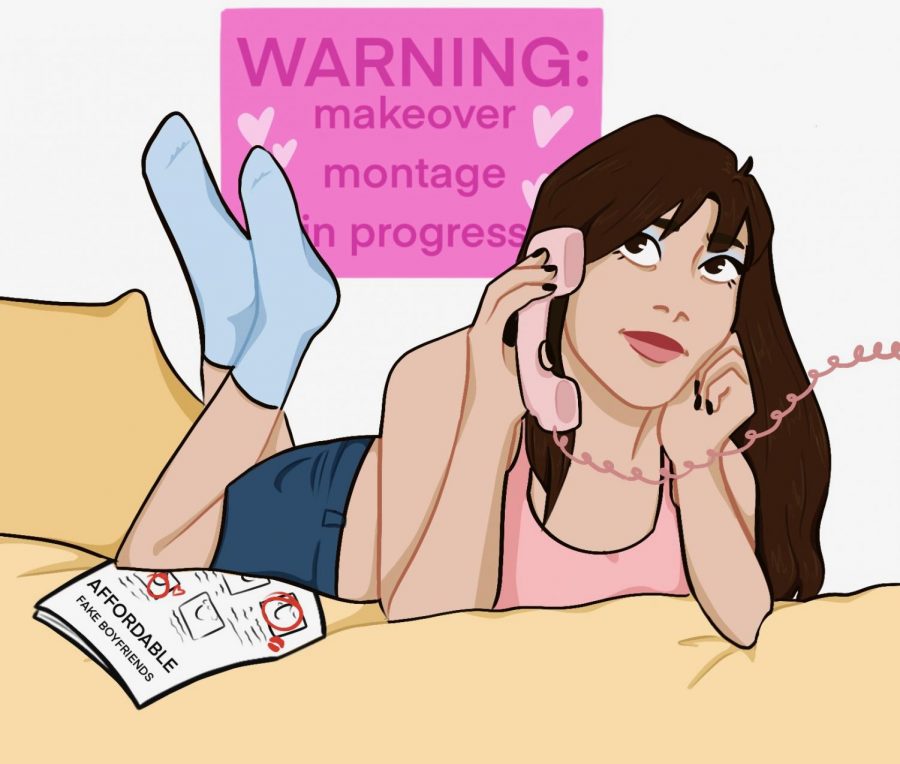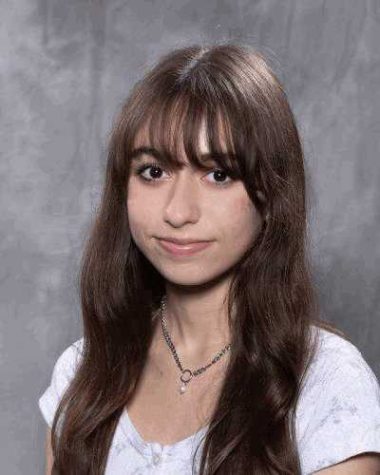The Mittle-man on Campus: A Review of the 2020-2021 School Year
Lying on her bed, the Mittle-Man advises a student on their love life through the phone.
May 24, 2021
‘The Mittle-man on Campus’ is a satirical column centered around high school clichés and the teenage experience. None of the articles in this column are representative of the opinions of The Chronicle staff as a whole.
The 2020-2021 school year has had one of the most creative plotlines yet, complete with a venue change, new cast members and a modern, digital format. The writers have tried something spectacularly unique by frequently shaking things up throughout the year, keeping students on their toes. Throughout the season, we wondered, “Will we go back to school tomorrow? Next year? Never??” Confusing emails about the return to campus only added to the suspense, leaving us enraptured by the story. However, while the 2020-2021 story arc is undoubtedly original, is it really what the student body is looking for? And as we go forward into next year, is creativity worth the effort?
The quality of this year’s plot was disappointing, especially after the dramatic 2020 season finale. This season persisted with the same, tired storyline for months. The pre-Thanksgiving rush of assignments was as dizzying as always, my winter break sleep schedule rendered me practically nocturnal and January was as miserable as ever. But the overarching theme of online school left the writer’s room without any opportunities to shine: there were no dances, no holiday parties and no thrilling on-campus romances. Time and time again, I advised the director to scrap the plot entirely, but he seemed insistent on making do. This foolish decision is plainly visible in the year’s sluggish pace—has it been a few months or a few centuries?
The concept of online school has frankly disappointed me. Off the bat, the 2021 plot was incredibly far-fetched: a global pandemic forces everybody to do Zoom school? That’s not exactly relatable. Not to mention it is completely derivative of the big plot twist of 2020. I suppose the directors thought they could just take last year’s drama and run with it, but a whole year and a half of an unrealistic storyline is bound to wear the student body out.
Relieved that the writers were finally willing to change it up, I was thrilled to return to campus. Last year’s plot twist was riveting, and this year follows in those footsteps, flipping everything on its head by bringing students back to school right before finals. So you can imagine the height of my expectations. Would there be a new indoor cafeteria inspired by “High School Musical?” Would they have brought in sparkling vampires and rugged werewolves? Perhaps a marching band would meet me by the pool and carry me to my first class. I was deeply disappointed to learn that I was still expected to walk on my own and that the new cafeteria was more reminiscent of a snack bar than the scene of a dramatic song and dance.
The first class came tragically early—8:30 a.m. The actors were completely drained of all energy, and a few of them even slumped over their desks, fast asleep. Now, I could understand this if their characters were notably always tired, but seeing both the school bully and the eccentric genius resting their eyes took me out of the scene. The second block was better: the actress who played the teacher did an exceptional job of chewing me out in front of the entire class for not understanding basic French. However, I did expect a love interest to come to my rescue, which to my dismay, did not happen.
The lunch period left me woefully underwhelmed. The Quad’s positioning in the middle of campus has so much untapped potential. I did not see a single school-wide musical number, leaving the campus barren of excitement. In order to get through the torturously boring hour of lunch, I took it upon myself to start singing in the middle of campus. Two minutes into my jovial song, “Why You Should Date Me,” I realized that nobody had joined in. The actors’ laziness made my performance a fiasco and reflected poorly on the school’s production value. It was expected that I would be satiated by a few Prom-posals, but none of them were directed at me. Cheering on the sidelines is not how I want to be spending my high school days. I hope that in the coming years, the directors develop a Musical Production Task Force (MPTF) to use that lunch hour wisely.
In class meeting, my dean tried to convince me to work on my Common Application, even though I had already assured him I was going to CULA undergrad and Harvard Law like Elle Woods. His insistence that I apply to “real colleges” was very off-putting and reduced the quality of my experience.
In general, the students didn’t seem to be very experienced method actors. Most of their conversations were repetitive and slow. During a single 15-minute-break, I counted 44 instances of students saying “I’m so tired.” Now, I understand that we got up before the sun, but shouldn’t they have undergone extensive training before arriving at school?
The most problematic thing of all was that the school simply has not mastered the realistic qualities of the teenage experience: there are no new kids stirring the pot, bullies slamming nerds up against lockers or dumb jocks making hilarious commentary. Classes start and end without budding romances, new rivalries or exciting plot points.
Coming back from online school, I’d expect a lot of high-intensity character development. But for lack of a better term, the school has lost the plot.
Now, my editor told me that reviews aren’t supposed to provide unsolicited advice, but I am obviously an exception to the rule. Next year, I recommend a CDC-approved Kissing Booth (since we’re sticking with the pandemic theme). We also absolutely need to rethink our school’s football team. Where are the romantic quarterbacks trying to sweep me off my feet? Tryouts next year should reflect our desperate need for some excitement on-campus. Where’s the drama, coach?
Although I respect the 2020-2021 school year’s creative plotline, it was a wasted opportunity to create the teenage experience we all hoped for. In coming years, the writers should continue to mix things up—but as they do so, they must remember to make plot points like our attention spans: short and sweet.
































